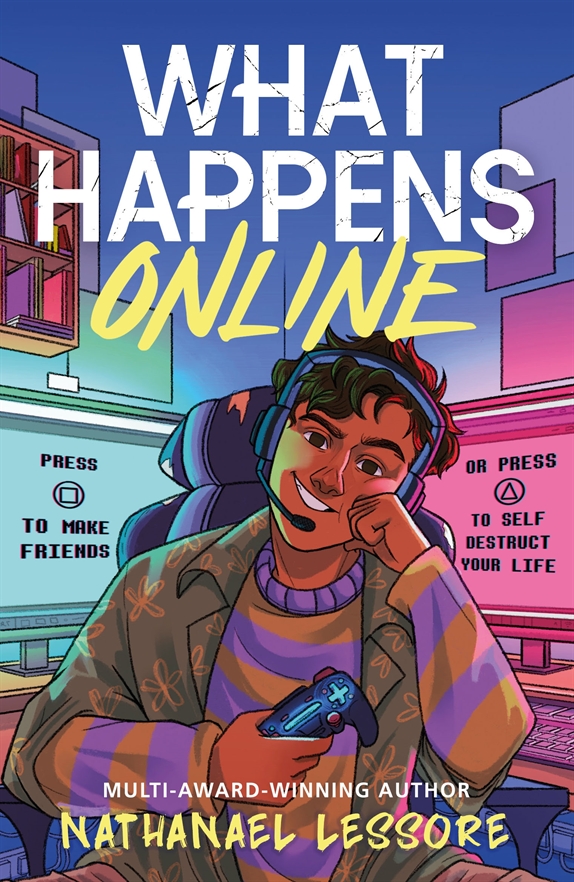
CILIP Carnegies Shadowers' Choice winner Nathanael Lessore talks to Pen&inc. about the issues in his
latest book What Happens Online. From how to approach discussions around online safety to the impact on mental health and wellbeing, Nathanael’s perspective provides a valuable starting point for discussions with young readers. You
can read a longer Interview with Nathaneal, including finding out more about his Carnegies Shadowers' Choice winning King of Nothing, in the next issue of Pen&inc., which is out in Autumn.
Pen&inc.:Can you tell us about the inspiration for your latest book What Happens Online.
Nathanael Lessore: Doing countless school visits, I regularly had students quoting videos, and games, and songs that they’d seen online. As an avid gamer myself, I know the pleasures of playing videogames, but I’m also
very aware of the darker aspects of the online world, especially the links between social media and teenage depression. We thought it’d be a fun, relevant discussion to explore.
P&I: It highlights some of the online activity that children and young people are having to deal with in digital spaces. How does your approach to these issues in the book help readers navigate the difficulties?
NL: I think seeing the issues as topics for discussion rather than a cautionary tale, can be more helpful. I also tried to highlight the difference between pleasure and joy, to emphasise that the type of relationship with
being online is down to the user.
P&I: And how did you go about researching the book?
NL: Lots of watching people, playing videogames, and seeing how users interact with gamers online, which was quite fun. But also going back over the statistics that show the (frequently damaging) links between teenagers’
mental health and the online world.
P&I: Can you talk about how these issues are impacting on young people in terms of mental health, anxiety, trust.
NL: The comparisons are a killer. Teenagers see a very specific part of people they admire, without seeing how staged everything else might be. Teens are comparing their real-world day-to-day, with a fake or fictional
representation of influencer’s lives.
Also, the rise in online bullying is devastating, and is completely ruining young lives. And the perpetrators who act without repercussion are very likely to continue spreading negativity. A lot of it is a mess. Homophobia, racism, and
misogyny are in lots of comments on a lot of posts. And young people are suffering through that.

P&I: There is a wider issue here around the choices young people are making – can you talk about the importance of books and reading as one of those choices?
NL: The empathy that teenagers learn through books has never been more vital (in my opinion). And it’s a fact that teenagers who read more tend to earn more money as adults, and will see more of the world. Books change
lives in a way that screens don’t. Reading isn’t just helpful to the individual, but on a macro scale it can shape generations.
P&I: There is evidence around secondary age boys reading less than they used to – what are your thoughts on that and what steps would you like to see being taken to reverse that?
NL: I was one of those boys. But I’m finding that fun books for teen boys can really truly help. The librarians and booksellers I’ve met are working hard to get books into boy’s hands. Kids who don’t see themselves in
books won’t read books. The remedy is relatable books for all teenagers.
P&I: And thinking about that drop off in reading, what role do you see for libraries and schools in encouraging more widespread reading for enjoyment. Should the government be thinking about how we fund reading for pleasure?
NL: Librarians are the unsung heroes of literature. The tireless work that goes into getting teens to read for pleasure, especially boys, is an immense job. And an ongoing job. But they’re doing it. Teachers are frequently
too exhausted, their time divided, but anyone who puts effort into reading for pleasure is shaping the future of the country, one pupil or school at a time.
I don't know enough about governmental spending to comment on should/shouldn’ts, but I do know that there’s a top down criminal lack of investment in libraries. Anyone who doesn’t take the issue seriously, if they’re in a position to do
so, is failing young people.
I’ve only been published a couple years, and am aware that I’m in no position to lecture anyone in this industry about anything. All my opinions are based on the very brief time I’ve been an author.
Subscribe to Pen&inc. to read more from Nathanael in our Autumn issue.




